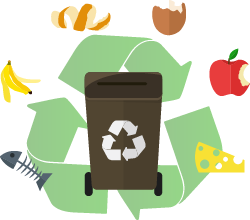Vinkkejä biojätteen lajitteluun
Biojätteiden lajittelu voi joskus tuntua vaikealta, mutta älä anna periksi! Meillä on ratkaisu yleisimpiin huolenaiheisiin, jolloin lajittelusta tulee mahdollisimman helppoa.
Lajitteleminen voi olla helppoa kuin heinänteko!
Biojäte on kaikkea ylijäävää syömätöntä mikä jää jäljelle kun olet valmistanut tai syönyt ruokaa. Yksinkertaista, eikö?

Kun paperipussi kastuu ja rikkoutuu
- Käytä biojätepusseillemme tarkoitettua biojäteastiaamme. Biojäteastia säilyttää pussin kuivana ja ilmavana.
- Laita pussiin mieluummin liian vähän kuin liian paljon biojätettä. Älä koskaan täytä pussia niin täyteen, että sitä on vaikea sulkea.
- Laita hieman talouspaperia pussin pohjalle ja huolehdi etteivät ruoantähteet ole liian märkiä kun heität ne pussiin.
Haisevatko biojätteet, kiusaavatko banaanikärpäset?
- Vaihda pussi useammin.
- On hyvä heittää biojätteet jäteastiaan joka kolmas päivä vaikkei pussi olisi täynnä.
- Banaanikärpäset biojätteessä ovat inhottava riesa – lajittele biojätteet ja mahdolliset sekajätteet useammin.


